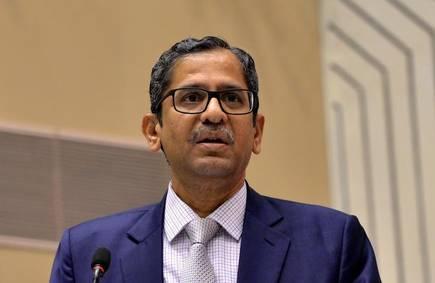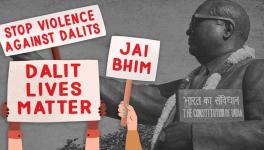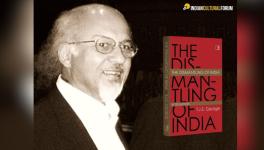CJI Ramana Asks Journalists Not to Allow Themselves to be Coopted by an Ideology or the State

Justice N V Ramana. Photo Courtesy: The Hindu.
The Chief Justice of India(CJI) N.V. Ramana on Wednesday said that performing your duty as a journalist is akin to dancing on a razor’s edge. He added that the journalists are on their feet for long hours and constantly on call and working. Holidays are few and far between and finding time to spend with family is difficult, said CJI Ramana. He was speaking at the presentation of the RedInk Awards by the Mumbai Press Club.
He said the freedom of the press is a valuable and sacred right enshrined in the Indian Constitution.
“Without such freedom, there cannot be discussion and debate that is essential for the growth of democracy. There can be no flow of information that the public requires, and that democracy demands”, he added.
Speaking on the roles of journalists, CJI said those serving in the conflict zones are willing to risk their lives. Those on regular beats are also no longer safe. Some of those in powerful positions, both political leaders and bureaucracy, mafia of all shades and those on the wrong side of the law – none of them are comfortable with a professional journalist, he said.
“As a result, you keep getting unpleasant and disturbing messages. I know it is not easy for you and your families to deal with such threats. Another worrisome trend is the concerted effort to bracket journalists into a particular category. I can imagine how painful it is”, CJI Ramana lamented.
Commenting on the race for breaking the news, the CJI said in the race for ratings, the important journalistic tenet of verification before publishing is not being followed. This, he added, leads to incorrect reporting.
“The social media amplifies that incorrect news in a matter of seconds. Once published it is difficult to take back. Unlike print and electronic media, unfortunately, it is almost impossible to hold the social media platforms such as youtube accountable even after they host most derogatory and defamatory stuff which has the potential to ruin careers and lives. You media professionals will have to voluntarily come forward with solutions for such a menace”, he said.
CJI Ramana advised the journalists to follow the principles of natural justice before making adverse comments against someone who is not in a position to defend himself.
He also flagged the ideological divide in the reporting. He said reporting nowadays is the seeping of ideological stances and biases into the news story.
“Interpretation and opinions are colouring what should be factual reports. News mixed with views is a dangerous cocktail. Connected to this is the problem of partial reporting, of cherry-picking facts to give it a particular colour. For instance, select portions of a speech get highlighted – mostly out of context – to suit a certain agenda. Nothing can be more lethal to democracy than the deadly combination of confrontational polity and competitive journalism. Tragically, they feed on each other. History is witness to this hard truth”, he said.
He warned that allowing yourself to be co-opted by an ideology or the State is a recipe for disaster.
“Journalists are like judges in one sense. Regardless of the ideology, you profess and the beliefs you hold dear, you must do your duty without being influenced by them. You must report only the facts, with a view to give a complete and accurate picture”, he stressed.
CJI Ramana also commented on the clickbait headlines. He said in the hope of grabbing the eyeballs, the headlines that are given for news reports are catchy, but misleading. “The headline is often unreflective of the actual content of the reports. It is interpretative and imaginary. The headlines are then shared widely on social media, and become the news. The content is forgotten”, he said.
He emphasized that the recent trend to sermonize about judgments, and villainise judges, needs to be checked.
“The media must have belief and trust in the judiciary. As a key stakeholder in democracy, media has the duty to defend and protect the judiciary from motivated attacks by evil forces. We are together in the Mission Democracy and in promoting national interest. We have to sail together”, he urged.
Speaking on the demands of specialists in journalism, the CJI said now the profession demands specialists. Earlier, one reporter could be deputed to report on diverse subjects. However, the nuances of reporting contemporary news in specific fields require specialisation. He gave an example of legal reporting stating that law reporting might require a person to be knowledgeable about precedents, legal history, and Court procedure.
“The resourceful media houses in Delhi have their specialist legal editors covering the proceedings of the Supreme Court. When it comes to other Indian Language media and small media houses, it is the regular political reporter who doubles up as legal reporter whenever the necessity arises. To be able to inform the readers and viewers accurately, the media needs to invest on specialists. I think it might be necessary for working journalists’ unions to organise training camps and orientation programmes for journalists like what we do for judges”, he spoke.
CJI paid tribute to photojournalist Danish Siddiqui who was killed in Afghanistan while on duty.
“He was a man with a magical eye and was rightly regarded as one of the foremost photo-journalists of this era. If a picture can tell a thousand words, his photos were novels. Wartime correspondents have always had the most difficult and risky job. His unfortunate passing in Afghanistan again brings to the fore the issue of sufficient safety protocols and protections for journalists in conflict zones. His spouse Ms. Frederike Siddiqui joined us online a while ago. My condolences to his family, colleagues, and friends”, CJI said paying homage to Siddiqui.
Get the latest reports & analysis with people's perspective on Protests, movements & deep analytical videos, discussions of the current affairs in your Telegram app. Subscribe to NewsClick's Telegram channel & get Real-Time updates on stories, as they get published on our website.
























